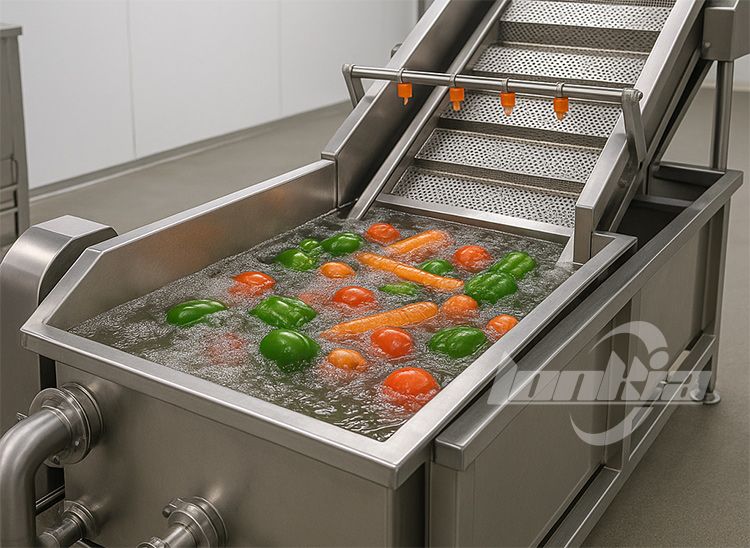In today’s food processing and hospitality industries, hygiene, efficiency, and productivity are critical. Choosing the right fruit and vegetable washing machine can help you meet food safety standards, reduce labor costs, and improve overall workflow. However, not all machines are created equal, and the best option for your needs depends on factors like the type of produce you handle, processing volume, and your budget.
Understanding the Main Types of Washing Machines
Bubble Washing Machines
Best for: Leafy greens, strawberries, soft fruits.
How they work: Use air bubbles to gently agitate water and lift dirt and pesticides without damaging fragile produce.
Advantages: Gentle on delicate produce, water-saving options, often come with filtration and ozone sterilization.
Brush Roller Washing Machines
Best for: Root vegetables like potatoes, carrots, ginger.
How they work: Use rotating brushes combined with spraying water to scrub off dirt and residues.
Advantages: Deep cleaning of stubborn soil, suitable for hard or uneven surfaces.

Spray-Type Washing Machines
Best for: Firm vegetables and fruits like tomatoes, apples, cucumbers.
How they work: Jets of high-pressure water spray produce on a conveyor belt or tray system.
Advantages: Fast, efficient, good for medium to large volumes, gentle on moderately firm produce.
Ozone Vegetable Washing Machines
Best for: Pesticide removal and microbial disinfection.
How they work: Ozone gas is dissolved in the water, sanitizing produce as it’s cleaned.
Advantages: Chemical-free sanitation, improves shelf life, eco-friendly.
Key Factors to Consider When Choosing
Processing Capacity: High-volume operations like food factories should prioritize industrial models with continuous feeding systems.
Type of Produce: Match the machine to the delicacy or hardness of your fruits and vegetables.
Level of Contamination: For heavily soiled produce, consider machines with brush rollers or combined scrubbing/spraying.
Sanitation Requirements: If targeting export markets or complying with strict food safety standards, ozone or UV-equipped washers are ideal.
Budget and Maintenance: Automated systems offer speed but may require higher initial investment. Consider operational costs and ease of maintenance as well.
Applications by Industry
| Industry | Recommended Machine Type |
| Central Kitchens | Bubble washer, spray-type |
| Vegetable Farms | Brush roller, continuous washer |
| Food Processing Factories | Conveyor-based industrial washers |
| Supermarket Processing Hubs | Compact bubble or spray machines |
| Exporters of Fresh Produce | Ozone or UV-integrated systems |
Final Thoughts
Choosing the right fruit and vegetable washing machine is about balancing cleaning performance, gentle handling, operational efficiency, and compliance. Investing in the right system now means better quality output, higher food safety standards, and long-term cost savings.

